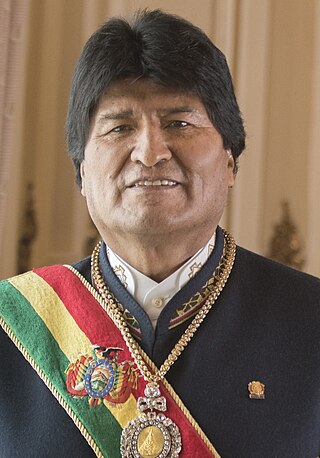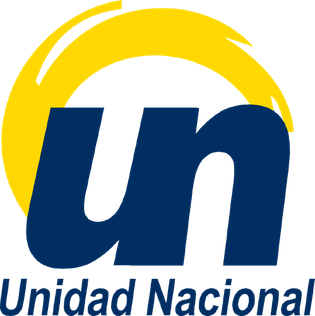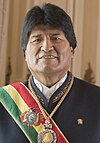Related Research Articles

Juan Evo Morales Ayma is a Bolivian politician, trade union organizer, and former cocalero activist who served as the 65th president of Bolivia from 2006 to 2019. Widely regarded as the country's first president to come from its indigenous population, his administration worked towards the implementation of left-wing policies, focusing on the legal protections and socioeconomic conditions of Bolivia's previously marginalized indigenous population and combating the political influence of the United States and resource-extracting multinational corporations. Ideologically a socialist, he has led the Movement for Socialism (MAS) party since 1998.
The Confederation of Indigenous Peoples of Bolivia is a national representative organization of the Bolivian indigenous movement. It was founded in October 1982 in Santa Cruz de la Sierra as the Confederation of Indigenous Peoples of the Bolivian East, with the participation of representatives of four indigenous peoples of the Bolivian East: Guarani-Izoceños, Chiquitanos, Ayoreos and Guarayos.

The National Unity Front is a political party in Bolivia. It was founded in late 2003 by Samuel Jorge Doria Medina Auza, who had broken with the Revolutionary Left Movement earlier that year. It has 36 members of the Chamber of Deputies in the Plurinational Legislative Assembly. Despite its substantial share of the urban vote, and 16 former mayors, it does not control any city halls or governorships. The party is closely identified with Doria Medina's cement company Sociedad Boliviana de Cemento (Soboce).

The current Constitution of Bolivia came into effect on 7 February 2009 when it was promulgated by President Evo Morales, after being approved in a referendum with 90.24% participation. The referendum was held on 25 January 2009, with the constitution being approved by 61.43% of voters.

Lesbian, gay, bisexual, and transgender (LGBT) people in Bolivia may face legal challenges not experienced by non-LGBT residents. Both male and female same-sex sexual activity and same-sex civil unions are legal in Bolivia. The Bolivian Constitution bans discrimination on the basis of sexual orientation and gender identity. In 2016, Bolivia passed a comprehensive gender identity law, seen as one of the most progressive laws relating to transgender people in the world.

Isiboro Sécure National Park and Indigenous Territory is a protected area and Native Community Land in Bolivia situated between the north of the Cochabamba Department and the south of the Beni Department. It protects part of the Bolivian Yungas ecoregion. The indigenous people living within the park belong to the Tsimané, Yuracaré, and Mojeño-Trinitario peoples. The southern portion of the park has been colonized by agricultural settlers, primarily coca farmers, since the 1970s. The Bolivian government estimates that 10% of the park has been deforested by their presence.
Bolivia has recognised same-sex civil unions since 20 March 2023 in accordance with a ruling from the Plurinational Constitutional Court. The court ruled on 22 June 2022 that the Civil Registry Service (SERECI) was obliged to recognise civil unions for same-sex couples and urged the Legislative Assembly to pass legislation recognising same-sex unions. The court ruling went into effect upon publication on 20 March 2023. The ruling made Bolivia the seventh country in South America to recognise same-sex unions.

Bolivia has had seventeen constitutions, including the present one, since its foundation in 1825.

The Presidency of Evo Morales began on January 22, 2006 when Evo Morales was inaugurated as the 80th President of Bolivia, following his victory in the 2005 general election, where he won 53.7% of the vote, defeating Jorge Quiroga, Samuel Doria Medina, and several other candidates. Morales increased taxation on the hydrocarbon industry to bolster social spending, emphasising projects to combat illiteracy, poverty, racism, and sexism. Vocally criticizing neoliberalism and reducing Bolivia's dependence on the World Bank and International Monetary Fund, his administration oversaw strong economic growth while following a policy termed "Evonomics" which sought to move from a liberal economic approach to a mixed economy. Scaling back U.S. influence in the country, he built relationships with leftist governments in the Latin American pink tide and signed Bolivia into the Bolivarian Alliance for the Americas. Attempting to moderate the left-indigenous activist community, his administration also opposed the right-wing autonomist demands of Bolivia's eastern provinces. Winning a recall referendum in 2008, he instituted a new constitution that established Bolivia as a plurinational state and was re-elected in 2009. His second term witnessed the continuation of leftist policies and Bolivia's joining of the Bank of the South and Community of Latin American and Caribbean States; he was again reelected in the 2014 general election. Following the disputed 2019 general election and the ensuing unrest, Morales resigned and flew to Mexico where he had been granted political asylum.
The Law Against Racism and All Forms of Discrimination is a statute passed by the Plurinational Legislative Assembly of Bolivia as Law 045 and promulgated by President Evo Morales into law as Law 737/2010 on 10 October 2010. The law prohibits discrimination and discriminatory aggression by public and private institutions and individuals, creates a governmental Committee Against Racism and All Forms of Discrimination, and bars the dissemination of racist and discriminatory ideas through the mass media. The provisions of the law applying to the media caused extensive controversy and were opposed by mainstream publications and media worker associations.
Native Community Lands, according to Bolivian law, are territories held by indigenous people through collective title. The creation of these territories has been a major goal of Bolivian indigenous movements and a political initiative pursued by both neoliberal and indigenous-identified national governments. TCOs are being included under the Indigenous Originary Campesino Autonomy regime. As of June 2009, 60 TCOs had been proposed in the lowlands, of which 12 had completed titling, and 143 had been proposed in the highlands, of which 72 had final titles. More than 16.8 million hectares have been incorporated within Native Community Lands as of December 2009, more than 15% of Bolivia's land area.

The Villa Tunari – San Ignacio de Moxos Highway, also known as the Cochabamba–Beni Highway is a road project in Bolivia connecting the towns of Villa Tunari and San Ignacio de Moxos. It would provide the first direct highway link between the two departments. The project has an expected overall cost of $415 million and extends 306 kilometres (190 mi), divided into three segments: Segment I from Villa Tunari to Isinuta, Segment II from Isinuta to Monte Grande, and Segment III from Monte Grande to San Ignacio de Moxos. Opposition to the highway by local indigenous communities, environmentalists, as well as shifting relations between the Bolivian government and the project's builders and funders interrupted construction of Segment I from October 2011 until October 2013, indefinitely delayed Segment II, and postponed construction of Segment III until June 2015. Segment II will proceed after the government has promised to raise living standards in the area.
The Pact of Unity is an evolving national alliance of Bolivian grassroots organizations in support of indigenous and agrarian rights, land reform, the rewriting of the 1967 constitution through a Constituent Assembly, and a left-indigenous transformation of the Bolivian state. Since 2005, the Pact has been a close ally of Bolivian President Evo Morales, and it forms the nucleus of the National Coordination for Change, a pro-government alliance.

Indigenous peoples in Bolivia, or Native Bolivians, are Bolivian people who are of indigenous ancestry. They constitute anywhere from 40 to 70% of Bolivia's population of 11,306,341, depending on different estimates, and belong to 36 recognized ethnic groups. Aymara and Quechua are the largest groups. The geography of Bolivia includes the Andes, the Gran Chaco, and the Amazon Rainforest.
The Framework Law of Mother Earth and Integral Development for Living Well is a Bolivian law enacted on October 15, 2012. It is the successor to the Law of the Rights of Mother Earth and was initially designed as full version of that law. According to Derrick Hindery, "the law clearly reflects both the more environmentally progressive ideals pushed by the Unity Pact and the extractivist agenda of the Morales administration."

Environmental personhood or juridic personhood is a legal concept which designates certain environmental entities the status of a legal person. This assigns to these entities, the rights, protections, privileges, responsibilities and legal liability of a legal personality. Because environmental entities such as rivers and plants can not represent themselves in court, a "guardian" can act on the entity's behalf to protect it. Environmental personhood emerged from the evolution of legal focus in pursuit of the protection of nature. Over time, focus has evolved from human interests in exploiting nature, to protecting nature for future human generations, to conceptions that allow for nature to be protected as intrinsically valuable. This concept can be used as a vehicle for recognising Indigenous peoples' relationships to natural entities, such as rivers. Environmental personhood, which assigns nature certain rights, concurrently provides a means to individuals or groups such as Indigenous peoples to fulfill their human rights.

Diego Pary Rodríguez is a Bolivian Quechua indigenous leader, educator, politician and diplomat. He served as Advisor to the Bolivian Constituent Assembly of 2006-07 and as Vice Minister of Higher Education. From 2011 to 2018 he served as Ambassador of Bolivia to the Organization of American States (OAS) and Concurrent Ambassador of Bolivia to Trinidad and Tobago, Jamaica, Dominica and The Bahamas. He was Foreign Minister of Bolivia from 2018 until 12 November 2019, following the resignation of Evo Morales.

Marianela Paco Durán is a Bolivian journalist, lawyer, and politician who served as minister of communication from 2015 to 2017. A member of the Movement for Socialism, she previously served as a plurinominal member of the Chamber of Deputies from Chuquisaca from 2010 to 2015.
The 2019 Sacaba massacre occurred when Bolivian soldiers and police attacked and broke up a protest led by Bolivian coca growers at Huayllani in Sacaba municipality, Cochabamba on 15 November 2019. It came in the first week of the interim presidency of Jeanine Áñez. Marchers intended to enter the town of Sacaba and proceed to the departmental capital of Cochabamba to protest the ousting of Bolivian president Evo Morales, but were stopped by the police and military. During the afternoon, police and soldiers clashed with protesters, and eventually soldiers opened fire on the crowd. Eleven demonstrators were killed; an estimated ninety-eight people were wounded, including four journalists and eight members of the security forces. Two hundred twenty-three protesters were arrested, many of whom suffered mistreatment and at least nine of whom were tortured.

The Ombudsman's Office of Bolivia is an independent governmental institution established by the Constitution, charged with overseeing the fulfillment, protection, and promotion of human rights in the country. The Ombudsman's Office is functionally, financially, and administratively independent of the four branches of Bolivian government. It was established on 22 December 1997 by Law N° 1818, and is currently regulated by Law N° 870 of 13 December 2016. Governance scholar Tom Pegram writes that "the Bolivian Ombudsman's Office has been recognized as arguably the most effective state actor in terms of advancing rights and active citizenship".
References
- ↑ Law on Mother Earth is passed, Evo will present it in Cancun. "Sancionan ley de la Madre Tierra; Evo la presentará en Cancun". La Razon. 2011-12-09. Archived from the original on 2013-01-27. Retrieved 2011-11-09.
- ↑ "Bolivia enshrines natural world's rights with equal status for Mother Earth". The Guardian. 10 April 2011.
- ↑ Pacto de Unidad (2010). Anteproyecto de Ley de la Madre Tierra por las Organizaciones Sociales del Pacto de Unidad (PDF).
- ↑ Ley (Corta) de Derechos de Madre Tierra , December 2010, article 5.
- ↑ Ley (Corta) de Derechos de Madre Tierra , December 2010, article 10.
- ↑ Ley (Corta) de Derechos de Madre Tierra , December 2010, article 3.
- ↑ Ley (Corta) de Derechos de Madre Tierra , December 2010, article 4.
- ↑ Filgueira, Begonia (2 June 2011). "And about time for rights to nature?" . Retrieved 9 November 2011.
- ↑ Ley (Corta) de Derechos de Madre Tierra , December 2010, article 7.
- ↑ Comunicaciones CAOI. "Bolivia: Pacto de unidad exige al gobierno la aprobación de la Ley de la Madre Tierra". Minga Informativa de Movimientos Sociales. Retrieved 9 November 2011.
- ↑ Ugarte A., Henrry (December 2010). "Apuran Ley de la Madre Tierra y en el agro están desconcertados". El Deber. Retrieved 2012-02-13.
- ↑ "Ley Madre Tierra será una de las primeras en ser aprobadas por el Senado". Erbol Digital. 2011-01-17. Retrieved 2012-02-13.
- ↑ "La Ley Marco de Consulta Previa fue incluida en el grupo de las 6 leyes urgentes para el MAS". Oxígeno. 2012-02-12. Archived from the original on 2019-01-15. Retrieved 2012-02-13.
- ↑ López-Bao, José Vicente; Epstein, Yaffa; Chapron, Guillaume (2019-03-29). "A rights revolution for nature". Science. 363 (6434): 1392–1393. Bibcode:2019Sci...363.1392C. doi: 10.1126/science.aav5601 . ISSN 0036-8075. PMID 30872530.
- ↑ Kotzé, Louis J.; Calzadilla, Paola Villavicencio (November 2018). "Living in Harmony with Nature? A Critical Appraisal of the Rights of Mother Earth in Bolivia". Transnational Environmental Law. 7 (3): 397–424. doi: 10.1017/S2047102518000201 . ISSN 2047-1025.
